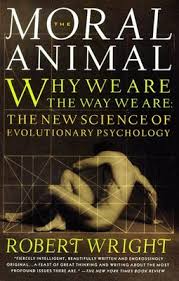 I’ve got a new book on order, which should arrive next week. It’s called The Evolution of God, written by Robert Wright. Wright is an author who writes about science and culture whose books I’ve enjoyed very much: Nonzero and The Moral Animal in particular. This new book sounds very interesting, and perhaps a bit controversial. It’s about how society’s idea of God changes over time. The Atlantic excerpted a part of the book in the April 2009 issue: One World, Under God. Robert Wright is currently a senior fellow at the New America Foundation. He is also the founder of Bloggingheads.tv, a wonderful site for frank discussion about current issues, science and politics. Here is an excerpt from The Atlantic article that gets to the heart of what Wright will descuss in the forthcoming book: “In any event, whether or not history has a purpose, its moral direction is hard to deny. Since the Stone Age, the scope of social organization has expanded, from hunter-gatherer society through city-state through empire and beyond. And often this expansion has entailed the extension of mutual understanding across bounds of ethnicity, religion, or nationality. Indeed, it turns out that formative periods in both Islam and Judaism evince the same dynamic as early Christianity: an imperial, multiethnic milieu winds up fostering a tolerance of other ethnicities and faiths.”
I’ve got a new book on order, which should arrive next week. It’s called The Evolution of God, written by Robert Wright. Wright is an author who writes about science and culture whose books I’ve enjoyed very much: Nonzero and The Moral Animal in particular. This new book sounds very interesting, and perhaps a bit controversial. It’s about how society’s idea of God changes over time. The Atlantic excerpted a part of the book in the April 2009 issue: One World, Under God. Robert Wright is currently a senior fellow at the New America Foundation. He is also the founder of Bloggingheads.tv, a wonderful site for frank discussion about current issues, science and politics. Here is an excerpt from The Atlantic article that gets to the heart of what Wright will descuss in the forthcoming book: “In any event, whether or not history has a purpose, its moral direction is hard to deny. Since the Stone Age, the scope of social organization has expanded, from hunter-gatherer society through city-state through empire and beyond. And often this expansion has entailed the extension of mutual understanding across bounds of ethnicity, religion, or nationality. Indeed, it turns out that formative periods in both Islam and Judaism evince the same dynamic as early Christianity: an imperial, multiethnic milieu winds up fostering a tolerance of other ethnicities and faiths.”
 Here is Publisher’ Weekly’s description of the book, which has been 10 years in the making: “In his illuminating book, The Moral Animal, Wright introduced evolutionary psychology and examined the ways that the morality of individuals might be hard-wired by nature rather than influenced by culture. With this book, he expands upon that work, turning now to explore how religion came to define larger and larger groups of people as part of the circle of moral consideration. Using a naïve and antiquated approach to the sociology and anthropology of religion, Wright expends far too great an effort covering well-trod territory concerning the development of religions from “primitive” hunter-gatherer stages to monotheism. He finds in this evolution of religion, however, that the great monotheistic (he calls them “Abrahamic,” a term not favored by many religion scholars) religions-Christianity, Islam, Judaism-all contain a code for the salvation of the world. Using game theory, he encourages individuals in these three faiths to embrace a non-zero-sum relationship to other religions, seeing their fortunes as positively correlated and interdependent and then acting with tolerance toward other religions. Regrettably, Wright’s lively writing unveils little that is genuinely new or insightful about religion.”
Here is Publisher’ Weekly’s description of the book, which has been 10 years in the making: “In his illuminating book, The Moral Animal, Wright introduced evolutionary psychology and examined the ways that the morality of individuals might be hard-wired by nature rather than influenced by culture. With this book, he expands upon that work, turning now to explore how religion came to define larger and larger groups of people as part of the circle of moral consideration. Using a naïve and antiquated approach to the sociology and anthropology of religion, Wright expends far too great an effort covering well-trod territory concerning the development of religions from “primitive” hunter-gatherer stages to monotheism. He finds in this evolution of religion, however, that the great monotheistic (he calls them “Abrahamic,” a term not favored by many religion scholars) religions-Christianity, Islam, Judaism-all contain a code for the salvation of the world. Using game theory, he encourages individuals in these three faiths to embrace a non-zero-sum relationship to other religions, seeing their fortunes as positively correlated and interdependent and then acting with tolerance toward other religions. Regrettably, Wright’s lively writing unveils little that is genuinely new or insightful about religion.”





